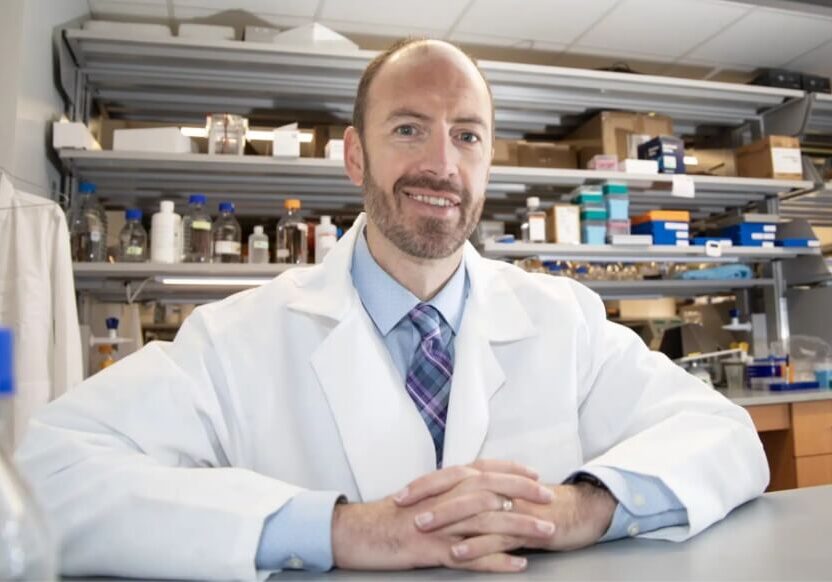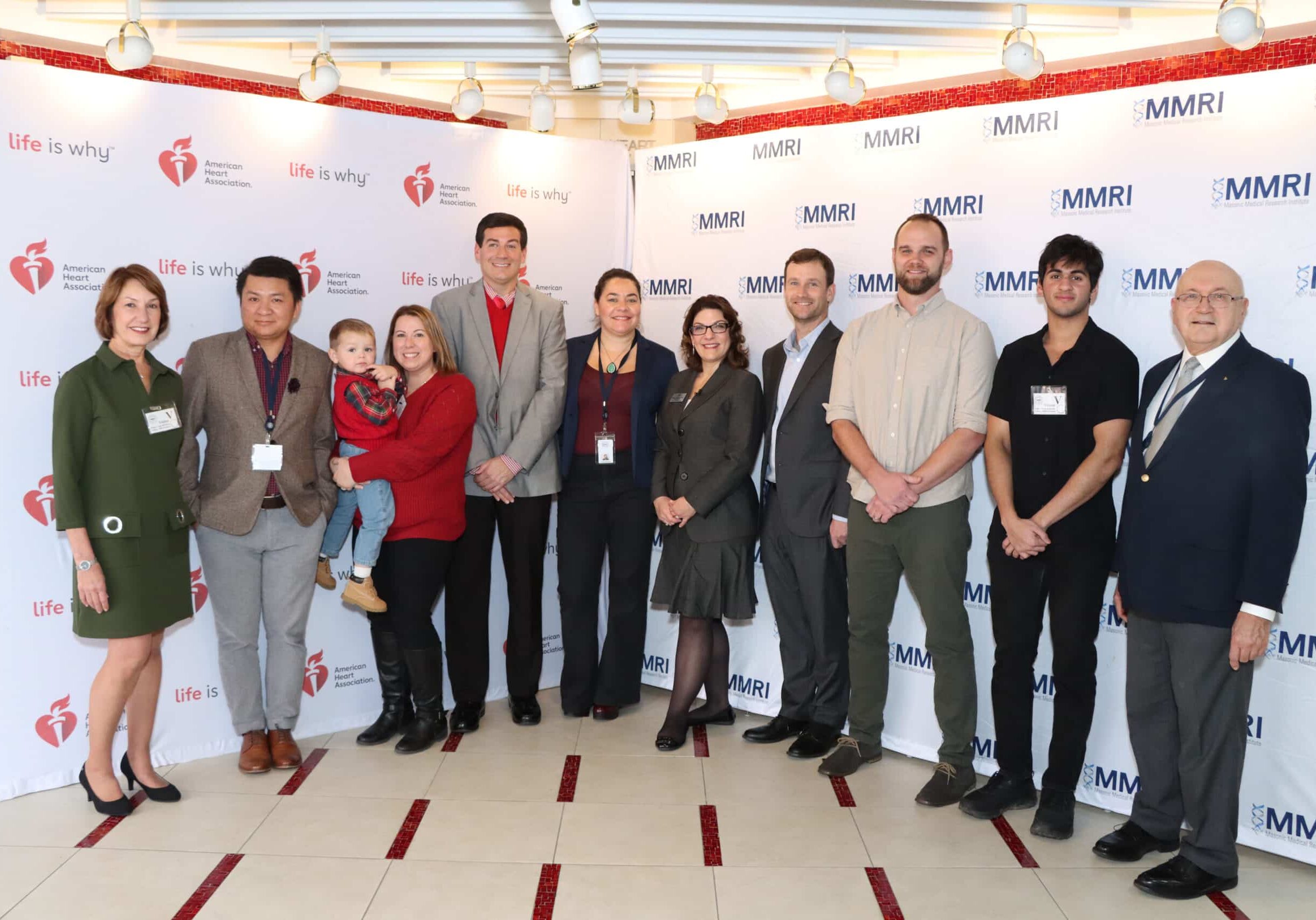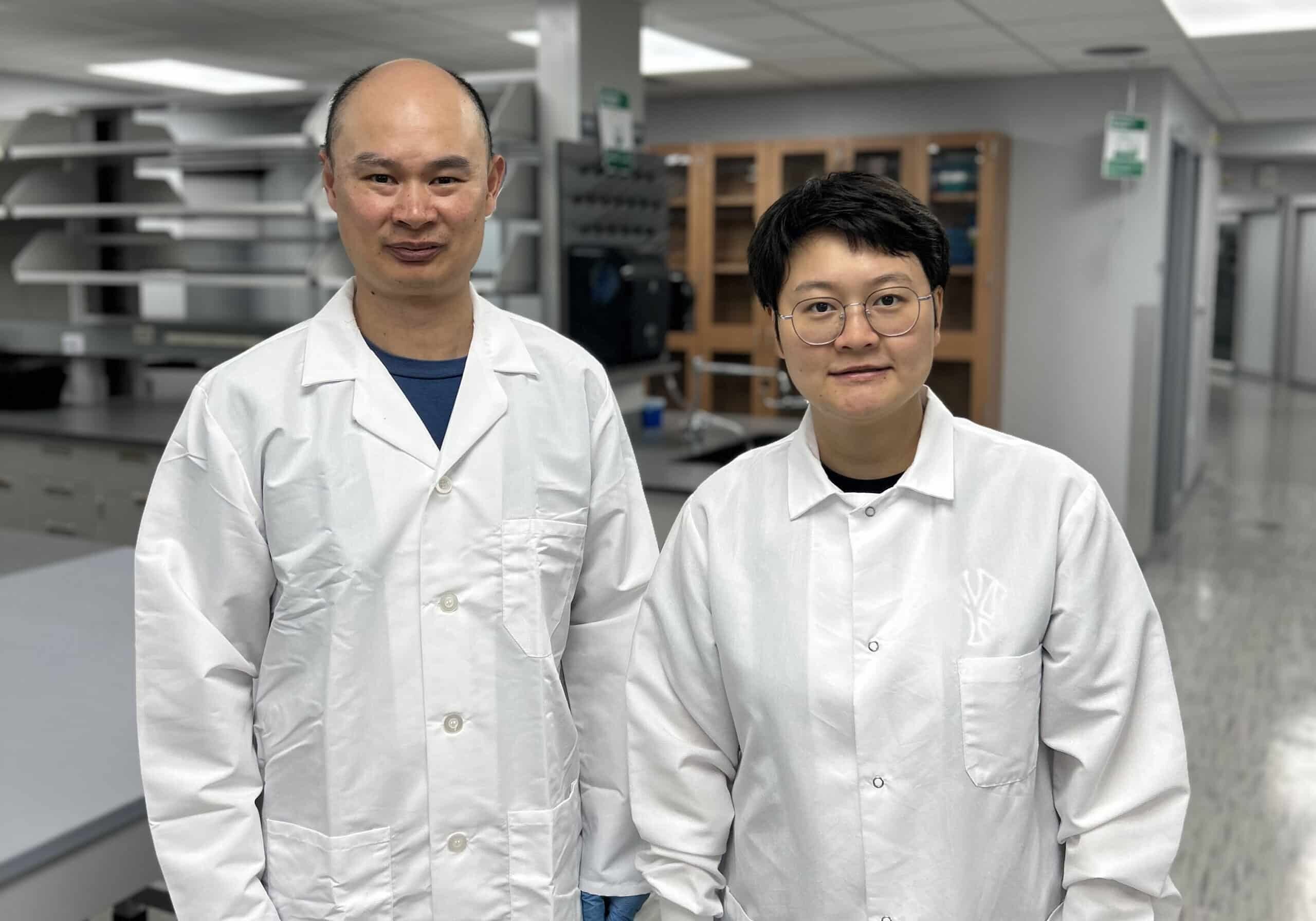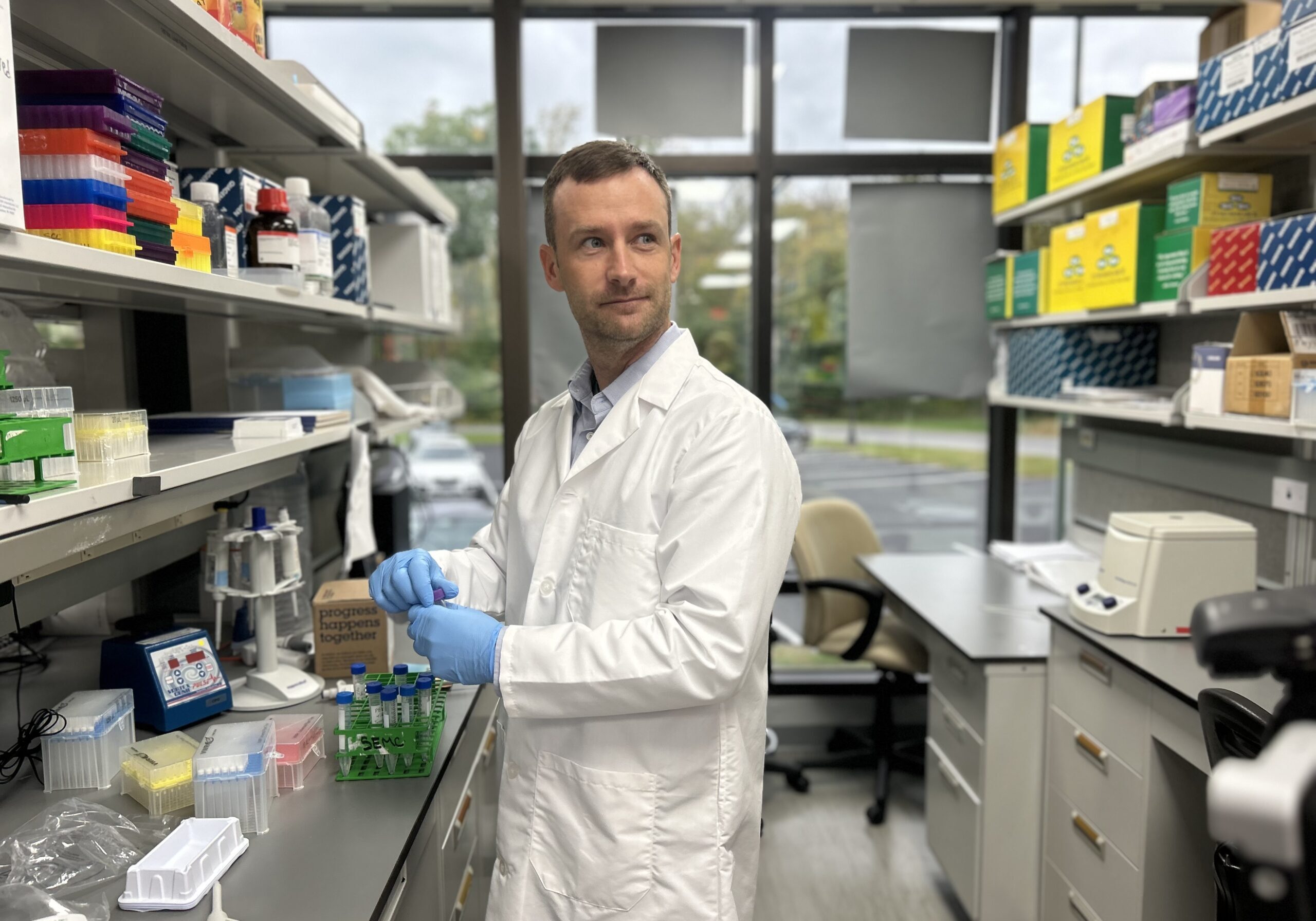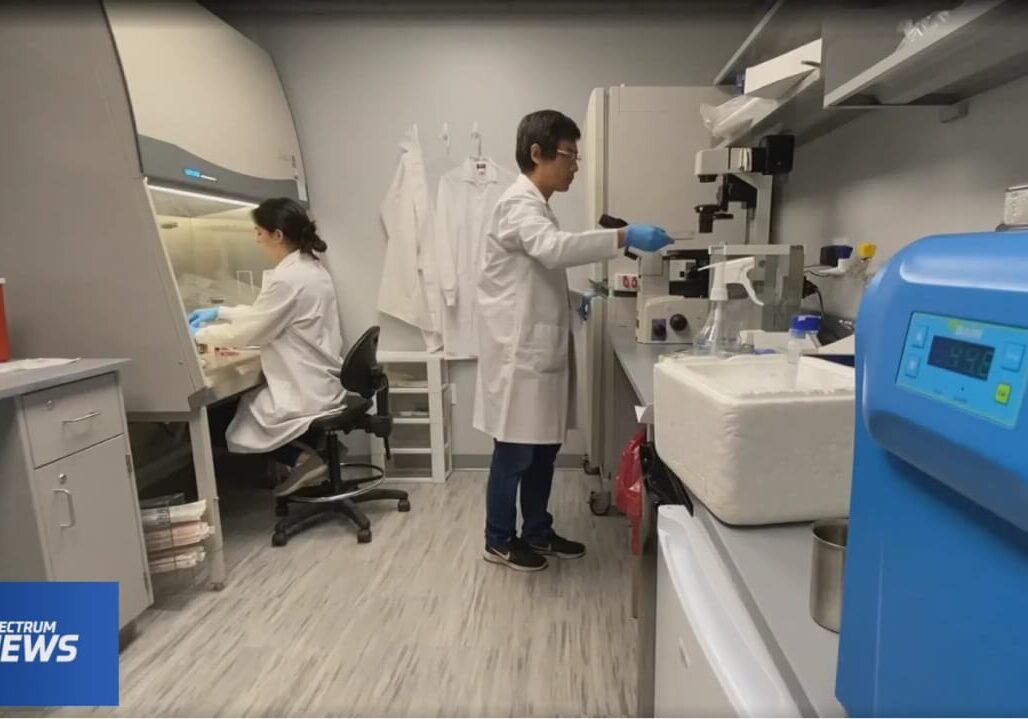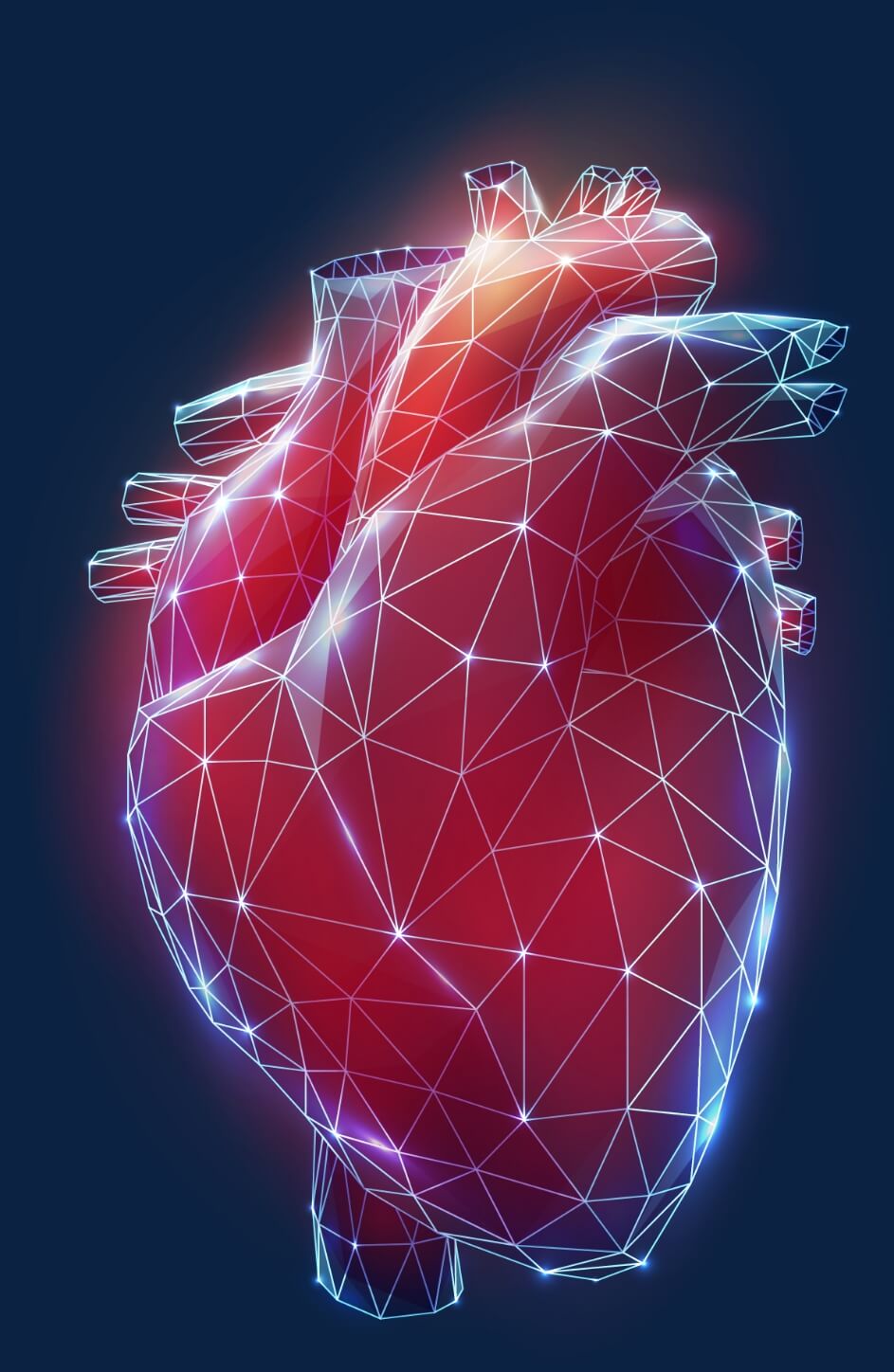
Heart Disease Research at MMRI
Since 1958, MMRI has been at the forefront of cutting-edge heart research. We have focused on understanding both the genetic and environmental causes to cardiovascular disease, in the hopes that we can find ways to better treat, and hopefully cure, these diseases.
According to the American Heart Association, someone in the United States dies of cardiovascular disease every 34 seconds. This means that 2,552 people die of cardiovascular-related illness each day. At MMRI, we are working hard to change these statistics. Since 1958, we have been making significant strides in understanding the causes of heart disease and working towards finding more effective therapeutic strategies. Our cardiac research is focused on delineating the molecular and genetic effects leading to the development and onset of congenital heart diseases, heart failure, cardiometabolic diseases, inflammation, cardiomyopathies, atherosclerosis, thrombosis and arrhythmias.
Adult Stage Heart Failure Research
Heart failure also known as congestive heart failure, is a serious condition that occurs when the heart no longer can pump enough blood to meet the body's needs. This can occur if the heart is too weak or stiff to pump properly, or when it can't fill up with enough blood to eject properly to the rest of the body. Symptoms, including shortness of breath, fatigue, and/or excessive coughing, can range from mild to severe. Heart failure can develop over time, due to chronic conditions, or can occur suddenly, due to a sudden cardiac event or injury. Conditions that can cause heart failure include arrhythmia, cardiomyopathy, coronary artery disease, heart attack and high blood pressure.
Arrhythmia Research
Arrhythmia refers to having an abnormal rhythm or heart rate, whereby the heart beats either too fast (tachycardia), too slow (bradycardia), or irregularly (atrial fibrillation). There are many factors that can lead to an abnormal heart rhythm, including heart attack, smoking, excessive alcohol use, congenital heart defects, stress, electrolyte imbalance and certain medications. Having an arrhythmia can affect the heart's ability to pump blood effectively and when untreated, can lead to heart failure, stroke or cardiac arrest.
Atherosclerosis
Atherosclerosis is a chronic condition characterized by the buildup of plaque inside the arteries. This plaque is composed of fatty deposits, cholesterol, calcium and other substances. Over time, the accumulation of plaque narrows and hardens the arteries, reducing or obstructing blood flow. This can lead to various cardiovascular problems, including heart disease, stroke and peripheral artery disease.
Cardiac Fibrosis
Cardiac fibrosis is a condition characterized by the excessive buildup of fibrous connective tissue in the heart, often referred to as “scarring” of the heart. Because fibrous tissue replaces healthy cardiac muscle cells, it can affect the heart muscle (myocardium) and disrupt the normal structure and function of the heart. Pressure overload, induced by hypertension or aortic stenosis, or a myocardial infarct (heart attack) can lead to extensive cardiac fibrosis, causing increased stiffness and diastolic dysfunction of the heart and eventually, to ventricular dilation and heart failure.
Cardiac Inflammation
Cardiac inflammation is a natural response to an injury or infection in the heart that can lead to inflammation of the heart tissue. There are multiple types of cardiac inflammatory disorders. Myocarditis affects the heart muscle (myocardium), and is caused by infections, like viruses, or other medical conditions, like autoimmune disorders. Endocarditis affects the lining of the heart valves and is usually caused by bacteria in the blood. Bacteria can enter the blood from other infections, like urinary tract infections or gum infections, or from medical or dental procedures, leading to cardiac inflammation. Pericarditis affects the tissues surrounding the heart (pericardium). Autoimmune diseases, such as rheumatoid arthritis and lupus, can cause pericarditis. Symptoms for cardiac inflammation include chest pain, shortness of breath, fatigue and swelling in the legs, ankles and feet; treatment depends on the type of inflammation and can include medications, surgery or other types of procedures.
Cardiometabolic Disorders
Diabetes, particularly type 2, significantly increases the risk of developing cardiovascular problems due to several interrelated factors that impact heart health. Cardiometabolic disorders refer to cardiac conditions that occur as a consequence of having had a heart attack, stroke, diabetes, insulin resistance, non-alcoholic fatty liver disease, hypertension, and/or other circulatory diseases. These conditions are considered to be largely preventable and are exacerbated by obesity, smoking, lack of exercise and poor diet. If left untreated, cardiometabolic disease can result in devastating health consequences, including heart failure.
Cardiomyopathy
Cardiomyopathies are diseases of the heart muscle (myocardium) that affect its structure and function, often causing the heart muscle to become enlarged, thickened, or rigid, and impacting the heart's ability to pump blood effectively. There are multiple types of cardiomyopathies, including dilated, hypertrophic, and restrictive, and they can be either inherited or induced by other medical conditions, including severe stress. Importantly, left unchecked, cardiomyopathies can lead to development of heart failure. While some people have no symptoms, others may experience shortness of breath, fatigue, dizziness, fainting, chest pain, swollen legs and feet and a bloated belly.
Congenital Heart Disease Research
1:100 children are born with congenital heart diseases (CHD), equating to a staggering 1.3 million children each year, and the numbers continue to rise year after year. CHD refers to defects that are present at birth and affect the heart’s structure, including the cardiac muscle walls, valves, chambers and/or blood vessels that carry blood to and from the heart.
COVID-19
COVID-19 is caused by the SARS-CoV-2 virus. Infection with this virus can cause symptoms similar to the common cold, flu or pneumonia. COVID-19 may affect multiple tissues, including the lungs, respiratory tract, heart and circulatory system, increasing the risk of arrhythmias, such as atrial fibrillation and for myocarditis, inflammation of the heart.
Embolism
An embolism is a blockage of a blood vessel caused by an embolus, which is a foreign substance or particulate matter that travels through the bloodstream and becomes lodged in a vessel. This blockage impedes or completely obstructs blood flow to the tissues supplied by the affected vessel, potentially causing significant damage or dysfunction.
Left Ventricular Non-Compaction (LVNC) Research
Left Ventricular Non-Compaction (LVNC) is a rare and often under diagnosed form of cardiomyopathy where the left ventricle, the heart's main pumping chamber, fails to fully develop its normal compacted muscle layer. This results in a characteristic appearance of deep trabeculations (or spongy, mesh-like structures) within the heart muscle walls and intertrabecular spaces that are not properly compacted.
Thrombosis
Thrombosis refers to the formation of a blood clot (thrombus) within a blood vessel, which can impede or completely block blood flow. This condition can occur in veins or arteries and may lead to serious health complications depending on the location and extent of the blockage.
Research Labs Working onHeart Disease
Kontaridis Lab
Explores the underlying causes of cardiovascular diseases in both children and adults, including congenital heart diseases, cardiomyopathies, heart failure, fibrosis, cardiac inflammation, arrhythmias, and cardiometabolic disorders, with the goal of developing innovative, life-saving treatments for these ailments.
News About OurHeart Disease Research
MMRI Scientist Publishes Breakthrough Study Detailing How Ketones Improves Blood Flow to the Heart
UTICA, N.Y. – Matthew Nystoriak, Ph.D., associate professor of biomedical research and translational medicine at Masonic Medical Research Institute (MMRI),…
Read MoreNIH Awards $3.7 Million Grant to MMRI Researcher Investigating Pulmonary Embolism
The National Heart, Lung, and Blood Institute (NHLBI) of the National Institutes of Health (NIH) recently awarded a $3.7 million…
Read MoreMaria I. Kontaridis, Ph.D., to Head National Council for the American Heart Association
On Monday, July 1, 2024, Maria Kontaridis, Ph.D., became the chair of the American Heart Association’s Basic Cardiovascular Sciences (BCVS)…
Read MoreMMRI Recruits New Associate Professor to Utica from University of Louisville
Matthew Nystoriak, Ph.D., has been recruited to Utica and named associate professor of biomedical research and translational medicine at MMRI.…
Read MoreAmerican Heart Association Go Red for Women Luncheon raises funds
We were honored to be a part of this year’s American Heart Association Mohawk Valley Go Red For Women luncheon,…
Read MoreMMRI Publishes Breakthrough Study Detailing a Novel Approach to Minimize Damage After a Heart Attack in Prestigious Scientific Journal
12.20.2023 Jason R. McCarthy, Ph.D., associate professor of biomedical research and translational medicine and scientific operations director at MMRI, recently…
Read MoreAmerica Heart Association invests in the future at Masonic Medical Research Institute
11.29.2023 Cardiovascular research is going strong at Masonic Medical Research Institute (MMRI), where four scientists currently have projects funded by…
Read MoreMMRI Welcomes New Faculty Member from UCSD with Laboratory Focused on Heart Development and Cardiovascular Medicine
MMRI Welcomes New Faculty Member from UCSD with Laboratory Focused on Heart Development and Cardiovascular Medicine Tongbin, Wu, Ph.D., assistant…
Read MoreNIH Awards $3.9 Million Grant to MMRI Researcher Investigating Cardiac Arrythmia
NIH Awards $3.9 Million Grant to MMRI Researcher Investigating Cardiac Arrythmia Nathan Tucker, Ph.D., hopes to identify genetic factors that…
Read MoreScientists Work to Identify, Treat Heart Disease
September 21, 2022 Spectrum News (video) https://spectrumlocalnews.com/nys/binghamton/news/2022/10/13/utica-scientists-finding-new-way-to-identify–treat-heart-disease Utica scientists work to identify, treat heart disease By Melissa Krull Utica…
Read MoreThank You
Hope For Curing The World's Most Prominent Disease
Your generous donation to our cardiovascular research program helps us fund lifesaving research - making a significant difference in the lives of others.












